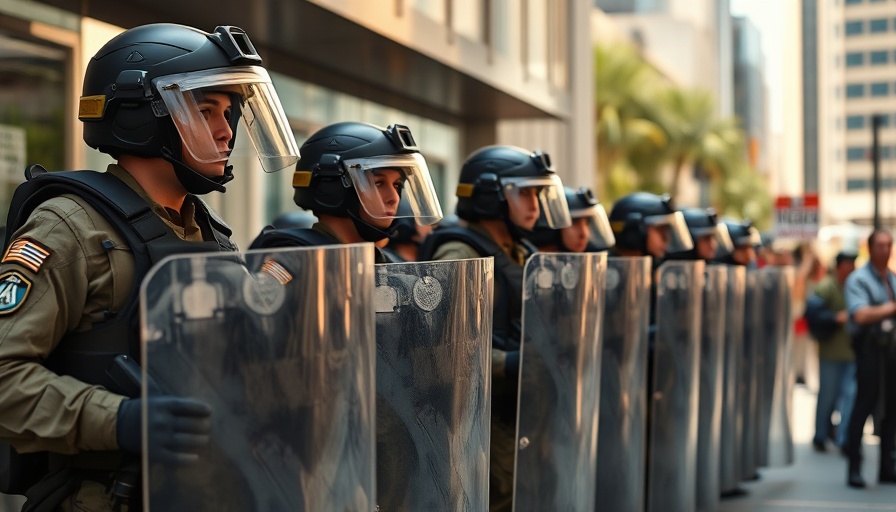
Federal Judge Issues a Resounding Rejection of Trump's Military Maneuvers
In a dramatic turn of events this past weekend, U.S. District Judge Karin Immergut found herself at the center of a legal showdown that has sparked heated debates regarding federal military authority. Hours after California Attorney General Rob Bonta filed a lawsuit against the Trump administration seeking to prevent the deployment of California National Guard troops to Portland, Oregon, Immergut granted a temporary restraining order obstructing the federalizing of troops from any state into Oregon. This hearing, characterized by its urgency and intensity, highlighted the contentious balancing act between state authority, federal oversight, and the political machinations at play.
Understanding the Background: Why is Military Deployment Controversial?
The backdrop of this legal contention involves ongoing protests in Portland at an ICE detention facility, which many see as an expression of dissent against federal immigration policies. President Trump has described Portland as 'war ravaged,' likening it to a 'war zone' needing military intervention. However, local officials paint a different picture, asserting that the protests have been relatively minor in scale, raising questions about the necessity of military action in a largely peaceful city.
Judge Immergut’s decision not only blocked the deployment of California troops but also extended her ruling to Texas National Guard members slated for the same purpose, showcasing a judicial motion to rein in what she characterized as presidential overreach.
The Legal Framework: Tenth Amendment and the Role of Federal Courts
At the heart of this legal battle are critical constitutional questions invoking the Tenth Amendment, which reserves powers not delegated to the federal government to the states. This conflict between state and federal authority has not only historical significance but contemporary implications as well. Judge Immergut made it clear that conditions on the ground in Oregon had not warranted the president's sweeping actions. Her courtroom grilling of federal attorneys illustrated a judiciary intent on checking executive power while affirming states' rights.
Local Officials Speak Out: A Battle for State Rights vs. Federal Might
California Governor Gavin Newsom voiced his support for Judge Immergut’s ruling, framing the case as a landmark clash against the misuse of executive power. Newsom contended that the president’s maneuver overstepped constitutional norms by deploying National Guard personnel across state lines against the objections of state governors.
In parallel, Oregon officials echoed similar sentiments, with Governor Tina Kotek stating, "Oregon will stand up to the president at every turn," framing the deployment as an ill-advised attempt to politically manipulate states that do not share his vision.
What Lies Ahead: Potential Legal Consequences and Political Fallout
This ruling carries the weight of further complications, as federal authorities have indicated intentions to appeal, arguing that the president retains authority under federal law to deploy troops for domestic unrest. This ongoing tug-of-war suggests that the legal battles will not settle soon, leading to hearing dates scheduled for further argument regarding a preliminary injunction against troop deployment.
As this situation develops, it raises pressing questions not only about military deployment protocols but also about the broader implications for civil rights and law enforcement conduct in politically charged environments.
The Takeaway: What Does This Mean for the Future?
The outcome of this case could set significant legal precedents regarding the limitations of presidential power in deploying National Guard units, potentially affecting future governance and state-federal relations. It is an urgent reminder of the delicate balance between maintaining order and respecting the rights of citizens, fueling a national conversation about civil liberties, public safety, and governance.
As we monitor the developments, both legal analysts and political commentators will continue to dissect the ramifications and implications of this unfolding situation, keeping the public informed and involved alongside the courts' proceedings.
 Add Row
Add Row  Add
Add 




Write A Comment